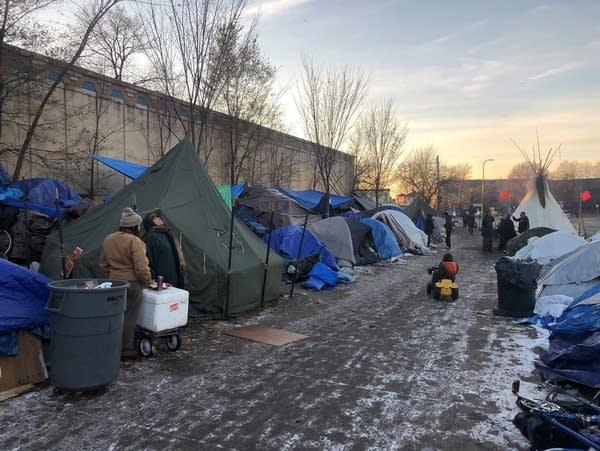Find a home for the homeless? It's no easy task in Minnesota

Go Deeper.
Create an account or log in to save stories.
Like this?
Thanks for liking this story! We have added it to a list of your favorite stories.
Melody Johnson had already been couch hopping for months when she found herself back at the homeless encampment along Franklin and Hiawatha avenues. She was there with her 10-year-old son and 12-day-old newborn daughter, and thought they'd be welcome in her friend's mom's tent.
Then she met an outreach worker employed by the Red Lake Nation, who called Adam Fairbanks, a consultant for the tribe. When he heard about Johnson's situation, he decided to invite them in to the suburban house he shares with his partner and two dogs.
Two months later, they're still at Fairbanks' home. While he's enjoyed hosting Johnson and her children, Fairbanks says he didn't think she and her kids would still be there.

"I'm well connected, and the tribe is setting up partnerships, and I know a lot of professionals," he said. "And I just really thought it was not going to be as hard as it has been."
Turn Up Your Support
MPR News helps you turn down the noise and build shared understanding. Turn up your support for this public resource and keep trusted journalism accessible to all.
Johnson's story offers a clear look at the hurdles homeless people face to secure stable, affordable housing. Simply finding a Twin Cities landlord willing to work with someone who's homeless is a huge challenge — even when a tenant has the rent money.
Johnson, for instance, has about $900 a month to spend on an apartment through a state program called Housing Support for people who have mental or physical disabilities or who have been homeless for a long time. It's usually administered by counties, but tribes also have the authority to sign people up for it.
Red Lake is using that power for the first time to help people from the encampment get stable housing, which is how Johnson got approved for the assistance. Like Johnson, a Red Lake band member, many people at the encampment are Native American.
Red Lake partnered with the Minneapolis-based nonprofit group Avivo to help in this effort; they've set the goal of housing 100 people over the next six months. So far, they've been able to find housing for 29 people. The rental assistance comes from the state, but Avivo has been covering the upfront costs to move in, like damage deposits, rental application fees and other expenses — about $800 per person. Those additional expenses may further limit how quickly Avivo can house people, which is why Red Lake has turned to crowdfunding in recent weeks.

Hennepin County is also trying to find people from the encampment housing. So far they've found housing for four families and 37 individuals.
It's difficult because, as Johnson and Fairbanks are finding out, many landlords want more than a rent payment.
Johnson doesn't have much rental history. She's been homeless pretty much constantly since she had her first baby at age 15. Now 35, she has a criminal history related to her alcoholism, including a felony DWI from eight years ago. She says she is sober now but the past follows her.
"A lot of people are like, 'You gotta make this amount of money or you have to have a credit score or a criminal background check.' And, you know, that's been a big challenge for me. But my biggest issue I want to say is being Native because there's a lot of stigma behind it," Johnson said.

Fairbanks, who's been helping Johnson search for apartments, says there's also a stigma around people with government subsidies.
"Sometimes they won't respond as soon as they hear the word subsidy. You know everybody has their own rules around what they want their properties to allow. And I get it. I'm a property owner myself. And being a landlord for folks with challenging backgrounds is, I'm sure, challenging for them. So it's this really difficult situation for both the people experiencing homelessness and landlords," Fairbanks said.
After nearly two months of searching, Johnson recently found a place in south Minneapolis with a landlord willing to accept her housing subsidy and look past her background.
She hopes this will give her and her kids enough stability so she can go back to school. She plans to move in next month.


